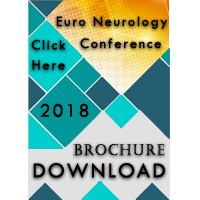Natalia Ivanova
Polenov Neurosurgical Institute, Russia
Title: Neuro-Rehabilitation in neurosurgery. Opportunities and prospects
Biography
Biography: Natalia Ivanova
Abstract
Introduction. The purpose of early rehabilitation (as a combination of neurological, rehabilitation and neurosurgical interferences in the form of interdisciplinary work) is promoting spontaneous recovery of patients and prevention of secondary complications.
Purpose: to assess the results of use early rehabilitation.
Methods: CT, MRT, EEG, ENM, rehabilitation scales.
Results: 1800 neurosurgical patients (neurotrauma, neurooncology, vascular neurosurgery, pediatric neurosurgery, vertebrologie, epilepsy, pain and spastic syndromes) received early rehabilitation. Etiology, pathogenesis, pathophysiological mechanisms, pathological conditions, the disease stage and duration of dysfunction before surgery have great importance for the restoration of the disturbed functions.
Neuroreanimation department: methods used in the acute period can produce paradoxical responses and lead to a breakdown of compensation: the need to find methods of stabilizing stem dysfunction as early as possible, stem dysfunction correction, body-oriented techniques, treatment of bulbar disorders, breathing exercises, passive gymnastics and position treatment with the gradual expansion of the motion mode, early verticalization prevention of bedsores, polymodal sensory stimulation.
Neurosurgical and rehabilitational departments: kinesitherapy with a maximum extension motor mode treatment for dysphagia, prevention and treatment of spasticity, treatment of flaccid paresis, correction of dysfunction of the pelvic organs, cognitive rehabilitation, speech therapy techniques, neuropsychological methods, prevention and treatment of pressure ulcers, simulation methods. Consequent cognitive impairment that worsen the prognosis of rehabilitation after neurosurgical pathology, a high degree of disability ( including those, due to the presence of intellectual and memory impairment), makes the problem of diagnosis and treatment of cognitive dysfunction socially significant.
Conclusion: Early rehabilitation improved the outcome and the long-term quality of life.

